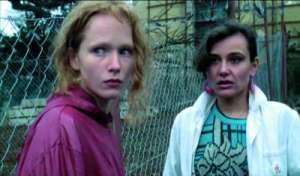Wild Bees/Divoké včely (2001)

Thursday / 2nd November 2006 / 20:00
Czech Republic / 2001 / 92 minutes / director: Bohdan Sláma / screenplay: Bohdan Sláma / cinematography: Diviš Marek / editing: Jan Daňhel / music: Miroslav Šimáček / cast: Pavel Liška (Laďa), Tatiana Vilhelmová (Božka), Zdeněk Raušer (Kája), Vanda Hybnerová (Jana), Jaroslav Dušek (game keeper) /
To watch Wild Bees is actually like watching a Czech New Wave film which was never made. It is built on the same principles and what is more, it deliberately relies on them. There are so many echoes and allusions. The raffle on the fire ball reminds us of Forman´s masterpiece The Fireman´s Ball (you cannot possibly think of anything else when you watch a scene where Božka is stealing) and everytime the train passes on the screen, Menzel´s Closely Observed Trains pop into your mind. If you add to this Sláma´s second film Something Like Happiness, there is no doubt that if there is someone who is able to revive the era of great Czech cinema with its specific feeling, it is him.
What strikes you first is the atmosphere. It is so realistic that it actually balances between a boring and a watchable film. The main character of Kája, played by non-actor Zdeněk Raušer, is so bad in his role that after few minutes you actually believe that he is not acting but playing his real self (and you notice that there are only few words in his repertoir which, to be honest, suit him). Luckily the rest of the professional cast save the film. Tatiana Vilhelmová´s performance is brilliant as usual and she proves that her position of one of the greatest actresses in Czech Republic is well deserved. Pavel Liška´s performance of Laďa, a great fan of Michael Jackson, is again one of the actor´s not very clever, attractive, neither lucky characters, with whom you nevertheless fall in love with in the end.
In a sense Wild Bees is a rural version of Ondříček´s Loners. The life in a small village in Moravia has its own problems which range from alcohol addiction (who would have thought that old ladies drink so much?!) and gambling addiction to typical relationship issues. However, one finds out gradually that the setting is not that crusial - whether it is situated in a village or a big town, problems people have are pretty the same.
Štefan Titka



